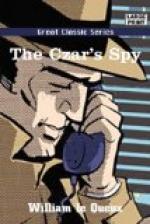“Mr. Santini, miss.”
“Ah!” exclaimed Jack quickly, as Olinto entered the room. “Then you had my note! We have asked you here to reveal to us this dastardly plot which seemed to have been formed against Mr. Gregg and myself. As you know, I’ve had a narrow escape.”
“I know, signore. And the Signor Commendatore is also threatened.”
“By whom?”
“By those who killed my poor wife, and who intended also to silence me,” was his answer.
“The same who compelled you take me to that house where the fatal chair was prepared, eh?”
“It was Archer, who, fearing that you came to London in search of them, devised that devilish contrivance,” he said in his broken English. Then continuing, he went on fiercely: “Now that I have discovered why my poor Armida was killed, I will tell the truth, and not spare them. Since you left Scotland, signore, I have been up in Dumfries, and have discovered several facts which prove that for some reason known only to himself, Leithcourt, while at Rannoch, wrote to both Armida and myself separately, making an appointment to see us at the same time at that spot on the edge of the wood, as he had some secret commission to entrust to us. The letter addressed to me apparently fell into someone else’s hands—probably one of the secret agents of Baron Oberg, who were always watching Leithcourt’s doings, and he, anxious to learn what was intended, made himself up to look like me, and kept the appointment in my place. Armida, having received the letter unknown to me, went up to Scotland, and was also there at the appointed time. What actually transpired can only be surmised, yet it seems that Leithcourt was in the habit of going up to that spot and loitering there in the evening in order to meet Chater in secret, as the latter was in hiding in a small hotel in Dumfries. Therefore those who formed the plot must have endeavored to throw suspicion upon Leithcourt. It is plain, however, as both myself and Armida knew the gang, it was to their interest to get rid of us, because the suspicions of the police had at last become aroused. Poor Armida was therefore deliberately enticed there to her death, while the inquisitive man whom the assassin took to be myself was also struck down.”
“By whom?”
“Not by Chater, for he was in London on that night.”
“Then by Woodroffe?” Durnford said.
“Without a doubt. It was all most cleverly thought out. It was to his advantage alone to close our lips, because in that same fatal chair in Lambeth old Jacob Moser, the Jew bullion-broker of Hatton Garden, met his death—a most dastardly crime, with which none of his friends were associated, and of which we alone held knowledge. He therefore wrote to us as though from Leithcourt, calling us up to Rannoch, in order to strike the blows in the darkness,” he added in his peculiar Italian manner. “Besides, he feared we would tell the signore the truth.”




